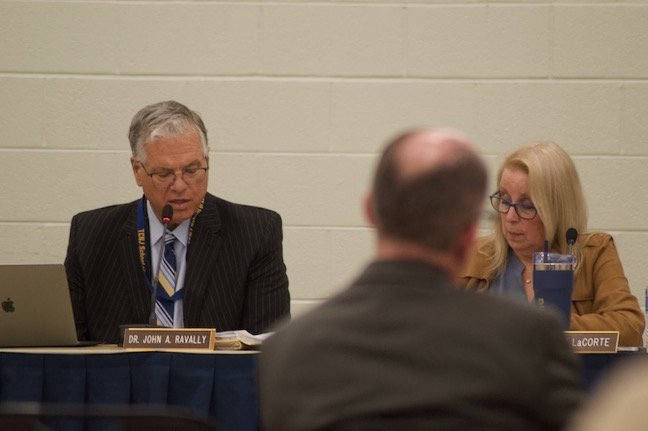School District Officials Promise To Get Tougher With FHS Fighting Students

Students who fight in Franklin High School face more stringent punishment than has been doled out in the past, the schools Superintendent said on February 23.
Superintendent John Ravally said at the monthly Board of Education meeting that FHS students caught fighting will be suspended and, once the suspension is over, they “will be put on a 45-day placement, while they’re seeking an alternative placement to finish out the year.”
Ravally’s remarks came in response to comments made by several FHS parents who asked district officials to impose harsher penalties than simply suspensions for students caught fighting. The suspensions, they argued, accomplish nothing.
The parents and Ravally were reacting to an uptick in fighting at the school. Ravally said there were seven fights in a three-day period in February, remarkable because in the four-month period prior to that, the most number of fights in one month was seven.
“That was alarming to us,” he said. “That’s why we called a safety committee meeting, that’s why we worked with the school administration to tighten things down.”
“When we see those upticks like we had two weeks ago, we have to quickly address them,” Ravally said. “I think we did, and not to say it’s perfect, but it’s getting better.”
Among the parents speaking was Debra Zavatsky, who has a child at FHS and also is a district teacher.
“I’m here as a parent to express my concern,” she said. “I don’t want the administration to just say we’re following our code of conduct; this is the best we can do. The ones that are not paying attention to these rules … these few are getting away with a lot. Oftentimes the administration says our hands are tied, we’re doing our best.”
Schools, she said, “need to be safe. They need to feel safe. They need to be a productive learning environment for all students. Right now, they don’t feel that way.”
“Even my kids are saying that the Code of Conduct is not being followed and that the leniency that’s being followed in our district is causing empowerment to the wrong students,” she said. “The students who are raising havoc have more power than the students who are doing what they need to do. That is upside-down.”
“There needs to be a no tolerance policy in place so these students don’t feel that they can get away with it,” she said.
“We need to make it so that these kids feel that they can improve in a structured environment,” Zavatsky said. “What happened to structure? What happened to rules?”
Tom Pydeski said parents are “curious about the action you’re going to take. If the violence that we’ve seen in the high school happened in the mall or some other public place, arrests would be made.”
Pydeski said that “95 percent of the students are following the rules, doing what they need to do, getting good grades, representing the school proudly … and that small portion has no consequences for what they do, and they continue to do it. For the fights to be broken up and the kids sent to detention or suspension, I don’t feel that’s enough.”
“We need to do something, and we need to do it before something serious happens,” he said.
Kelly Probst, who said she works in a nearby school district, told the Board that her students were showing her videos of fights at FHS during the course of one day.
“Look what’s going on at your kids’ school,” she said. “I was going out of my mind.”
Probst said one of teh problems is the ease students have in communicating with other over cell phones.
“I would like to see a stricter phone policy at the high school and the middle school,” she said. “The phone is a big problem. It’s all coordinated, I see it all day.”
“Chronic kids fighting don’t belong with the kids trying to get an education,” she said. “The phones are the problem, and the consequences are lame.”
Many school districts are “challenged” by their phone policies, Ravally said.
He said the district once looked into putting the phones into “phone bags” but that proved impractical.
“Kids have already figured out a way around that,” he said. “They buy one phone that they use, and another phone that they don’t use is the one they put in the bag.”
Ravally said the District could more strenuously enforce its Electronic Recording Device Policy.
“If we see you whip out your phone, we can only assume that you’re videotaping with it,” he said. “We’re going to do a better job with challenging students who do that and providing consequences for students who do that, from as minimal as taking your phone and giving it back to your parents to detentions, Saturday detentions, even suspensions.”
While eliminating phones is not practical, Ravally said, “but what we can do is control how the phones are being utilized and when they’re being utilized.”
“We’re going to do what we can, and it can be a lot, to try to start to discourage how these phones are being used inappropriately,” he said.
Ravally said the District also has to do a better job supporting students’ mental health issues.
“We’ve engaged with the right people, but we’ve got to do a better job connecting kids with the resources,” he said.
Board members also weighed in on the issue.
“I appreciate you coming out, your concern is our concern,” Board member Walter Jackson told the parents. “I encourage you to support us, because we do hear you. We’ll make sure that your voices are heard and your concerns are heard. We’re all here because our district is a great one and I want our district to be an example for other districts in the state.”
“One of the things that’s great about Franklin is that we’re all united to make sure that our kids have the best, and that you not only come to tell us what concerns you, but you come with potential solutions and ways to help,” Board member Laurie Merris said. “Even in tough times, we’re working together for the good of our town and our children.”
Board member Bill Grippo said it was important to look at the “98 percent of our students who are doing just fantastic.”
“This period we’re going through is a dark time,” he said. “But I think our Superintendent and the board are working out of it. I’m going to predict that you’re going to see a marked improvement.”
“We’ve been through difficult time and I’m sure as we continue to work together … kids will learn how to deal with this stuff,” Board member Nishita Desai said.
Board member Sammy Shaban said that “I do see the darkness, but there’s a lot of light there to. I think we do have a to be a little bit tougher, but it’s going to be through education that we’re going to figure out how to move these kids forward.”
“Engaging them as part of the solution … is going to be helpful,” he said. “All together, we’re going to get it done.”























































